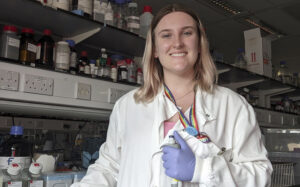Innovative research into the behaviour of cancer cells when they migrate to new sites in the body is underway at Reading – made possible by University of Reading graduates and long-term donors, Roger and Jennifer Isaac.
Despite remarkable advances over the years there is still much about cancer which is poorly understood. One such area is metastasis – the process by which cancer cells spread around the body.
Pre-metastatic cancer can usually be cured, but this is rarely the case once it has metastasised – 90% of cancer deaths follow metastasis. We need a deeper understanding of the process.
PhD student Kimberley Perry alongside Professor Phil Dash, Head of the School of Biological Sciences and Professor of Cancer Biology, is now focusing on this research – with Kimberley’s PhD being fully funded by Roger and Jennifer Isaac.
Life-changing funding
Roger and Jennifer’s decision to donate specifically to support Kimberley and her research has been pivotal. Professor Dash put it bluntly: “We would have struggled to get this project funded without the Isaacs.”
“Thanks to them, we can do this essential science while training a highly capable, motivated research scientist. Over the long term, this giving could make a staggering difference.”
Roger said: “We’re so impressed with Kimberley, Phil and the team, and the research they’re doing. And the University has really got the balance right when keeping in touch – engaged but not pushy. We feel our contribution is valued.”
 Kimberley certainly values the Isaacs’ generosity. Having chosen Reading for her undergraduate and master’s degrees because of the opportunity to focus on cancer, she wanted to progress to a PhD. However, there was no funding available and, having looked at alternative PhDs and even teaching jobs, it looked like Kimberley was going to have to abandon her life in Reading entirely.
Kimberley certainly values the Isaacs’ generosity. Having chosen Reading for her undergraduate and master’s degrees because of the opportunity to focus on cancer, she wanted to progress to a PhD. However, there was no funding available and, having looked at alternative PhDs and even teaching jobs, it looked like Kimberley was going to have to abandon her life in Reading entirely.
At this point Roger and Jennifer were talking to Professor Dash about focusing their donations entirely on cancer research. The result was full funding for Kimberley’s PhD and the necessary equipment. “It was an overwhelming, life-changing moment,” Kimberley recalled.
The key
Key to Kimberley’s research is metastatic dormancy – the tendency of metastasising cancer cells to become dormant and (until they reactivate) harmless, on arriving at a new site, having migrated from their original tumour.
Studying dormant cells is challenging. They are invisible to established detection strategies, which only work with numerous, active cancer cells. A priority, therefore, has been to develop new ways of studying cancer cells as they arrive in new parts of the body.
The research relies on a process called decellularisation, whereby cells are chemically removed from a mouse liver. The liver is one of the most common yet least studied sites for the spread of cancer. After this process, researchers are left with an Extracellular Matrix (‘ECM’), its structure defined by a natural framework of proteins.
Meanwhile, cancer cells are genetically modified to produce fluorescent proteins from jellyfish and coral, making them visible under the microscope. Injected into the decellularised liver, they can be observed, tracked and measured as they arrive in their new environment, become dormant and later re-activate.
Professor Dash is excited by the possibilities. He said: “We could use healthy liver cells from donors to grow human liver tissue in the ECM, and then inject fluorescent cancer cells to observe how they interact with human tissue. Or, with age and obesity both risk factors for cancer, we could use tissues from older or obese animals. We could use the process for other organs and tissues too.
“It’s an entirely new, flexible framework for doing this essential research.”
Reigniting the flame
The impact of Roger and Jennifer’s generosity for Kimberley has been significant. She’s been able to present and defend her interim research findings at Turin’s European Association of Cancer Research Conference and Geneva’s World Congress Cancer Conference, as well as teaching in Biology practical sessions at the University, and continuing to build her life in Reading. She said:
“I’ve been passionate about cancer research for years – the Isaacs’ generosity reignited the flame when it seemed snuffed out. I’m so grateful to have the opportunity to do my PhD, and for all the possibilities it’s opened up.”
If you would like to find out more about the projects our donors support, visit www.reading.ac.uk/imagine.






